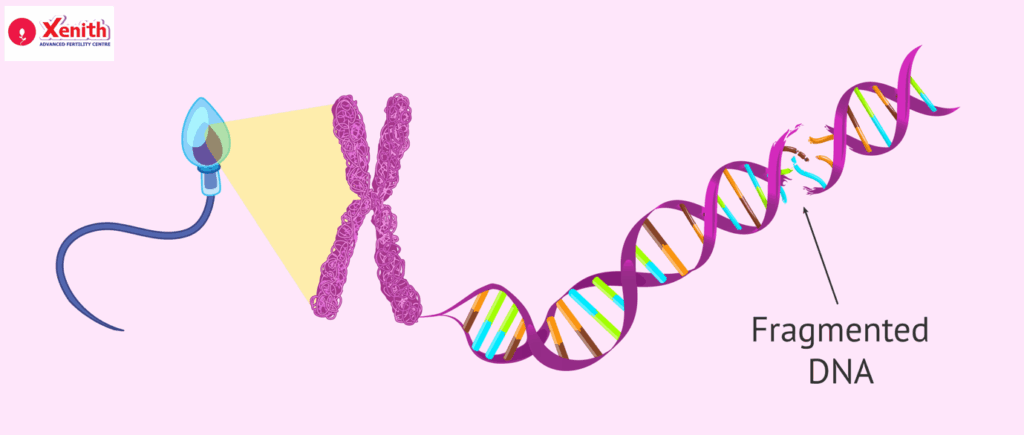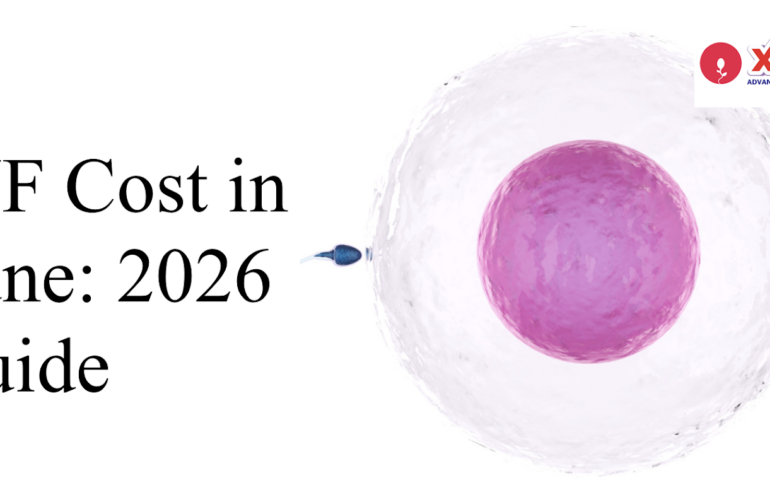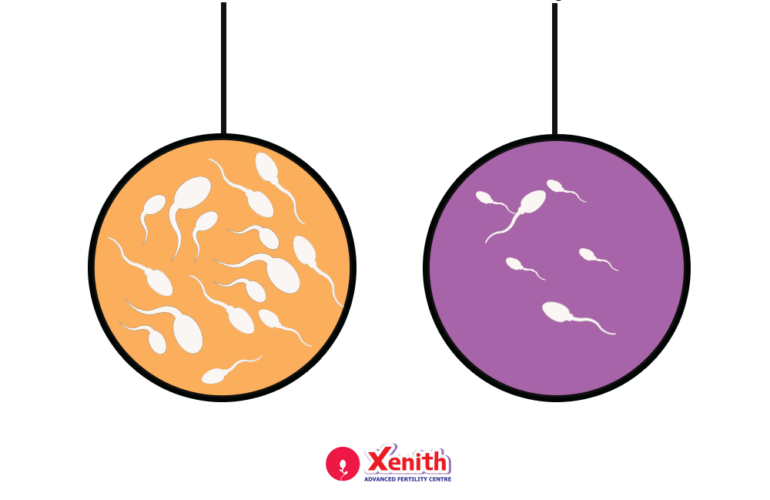Introduction to Sperm DNA Fragmentation Test
Male infertility testing has advanced significantly in recent years, moving beyond standard semen analysis to more precise diagnostics like the sperm DNA fragmentation index test (DFI). This test is especially useful for identifying underlying issues in sperm quality and DNA damage that may not be visible through conventional parameters.
Sperm DNA fragmentation testing (DFI) is a newer diagnostic tool that goes beyond routine semen analysis by evaluating genetic integrity—an often overlooked but crucial aspect of male fertility. Elevated DNA fragmentation can negatively impact fertilization, embryo development, and implantation, potentially leading to infertility or pregnancy loss. For couples facing unexplained infertility, repeated IVF failures, or recurrent miscarriages, this test provides essential insight into the male partner’s reproductive health.
Studies show that up to 30–40% of men with normal semen parameters may have elevated DNA fragmentation.
Understanding and addressing high sperm DNA fragmentation is crucial for improving fertility outcomes, and the DFI test plays a central role in guiding effective treatment plans.

Free Thursday Consultation
Book Your AppointmentXenith Hope Circle
Join our new WhatsApp community
Table of content
- What Is Sperm DNA Fragmentation Index (DFI)?
- Who Should Consider a Sperm DNA Fragmentation Test?
- How Is the Sperm DNA Fragmentation Test Performed?
- Causes of High Sperm DNA Fragmentation
- Treatment and Lifestyle Changes to Reduce Sperm DNA Fragmentation
- Why Choose Xenith IVF Clinic for Sperm DNA Fragmentation Testing?
- Frequently Asked Questions
The DFI test for male fertility is a specialized diagnostic that measures the percentage of sperm with fragmented or damaged DNA. A high DNA fragmentation index (DFI) is associated with reduced reproductive success, even when sperm count and motility appear normal.
This test is a powerful predictor of male fertility potential and can help identify whether sperm DNA damage might be contributing to infertility. High DFI levels have been directly linked to IVF failure and recurrent miscarriages. So yes, to answer a common question—can high DFI cause miscarriage? Unfortunately, the answer is yes, it can increase the risk.

The sperm DNA fragmentation index test (DFI) is particularly recommended for:
- Men with unexplained infertility or those who have faced multiple failed IVF or ICSI cycles.
- Individuals with lifestyle risk factors such as smoking, poor diet, stress, or exposure to environmental toxins.
- Men diagnosed with varicocele, or those previously exposed to radiation, heat, or pollutants.
- Men over the age of 40, as DNA fragmentation tends to increase with age.

Conducting a sperm DNA fragmentation test is straightforward:
- A semen sample is collected after a few days of abstinence.
- The sample is analyzed using advanced techniques like:
- SCSA (Sperm Chromatin Structure Assay)
- TUNEL (Terminal deoxynucleotidyl transferase dUTP nick end labeling)
- COMET assay
Results are usually available within a few days, depending on the technique used.
These methods help determine the degree of sperm DNA damage, and the DFI score indicates fertility potential:
- <15% DFI: Excellent fertility.
- 15–25% DFI: Moderate fertility; potential issues.
- 25% DFI: High fragmentation; likely fertility complications.
Understanding these results is key when determining the right course of action for treatment or assisted reproduction.
There are numerous causes of sperm DNA fragmentation, many of which can be addressed or managed. Common contributors include:
- Oxidative stress, which damages sperm at the cellular level.
- Unhealthy lifestyle habits like smoking, alcohol consumption, poor nutrition, and obesity.
- Medical issues such as infections, chronic illness, and especially varicocele.
- Environmental exposures to heat, radiation, heavy metals, and industrial chemicals.
Thankfully, high DFI is often reversible with the right approach. The best treatment for high sperm DNA fragmentation includes both medical intervention and lifestyle change:
- Antioxidant therapy to combat oxidative stress.
- Surgical repair of varicocele, which has been shown to improve DFI.
- Advanced sperm selection through ICSI, PICSI, or IMSI to choose sperm with the most intact DNA.
- In severe cases, TESE (Testicular Sperm Extraction) may provide better-quality sperm with lower fragmentation.
If you’re wondering how to reduce sperm DNA fragmentation naturally, start with:
- A nutrient-rich diet (high in fruits, vegetables, omega-3s, and antioxidants).
- Regular exercise and weight management.
- Reducing exposure to heat and environmental toxins.
- Practicing stress reduction techniques such as yoga, meditation, or counselling.
- Stop smoking and limit alcohol—both are proven contributors to oxidative damage.
Adopting these changes can significantly improve sperm quality and reproductive success.
EXCELLENTTrustindex verifies that the original source of the review is Google. It was a wonderful experience. The staff is extremely co-operative. Special thanks to Dr. Pooja for taking utmost care and being available always. Really appreciate the efforts of the entire Xenith team.Posted onTrustindex verifies that the original source of the review is Google. I had a wonderful experience at Xenith IVF. The team took amazing care of us throughout the journey and made us feel supported at every step. Truly grateful and very happy with the experience.Posted onTrustindex verifies that the original source of the review is Google. Best doctor's ever, good experience, all staff are supporting.Posted onTrustindex verifies that the original source of the review is Google. Efficient and well-organized center. Friendly and understanding receptionists; amazing and phenomenal service of the doctors. It has truly been a wonderful experience. Thank you.Posted onTrustindex verifies that the original source of the review is Google. After a long journey, Xenith IVF helped make my dream come true through IVF. I am most thankful to Dr. Mamta Dighe, along with Dr. Pooja, Dr. Poonam, Dr. Reshma, and Dr. Minal, for their exceptional care and support throughout this process. The sisters Ms. Sonia, Ms. Mayuri, Ms. Pallavi were kind and attentive, and the reception team Ms. Kalyani, Ms. Samiksha, Ms. Sharayu was polite and welcoming. The clinic maintains state-of-the-art lab facilities with advanced technology and strict hygiene standards, which gave me confidence throughout the process. I also appreciate their complete transparency in procedures and clear communication at every step, which made the experience stress-free and trustworthy. The team ensures maximum patient comfort and provides emotional support during every stage, patiently answering questions and offering reassurance when needed. Xenith IVF is known for its high success rates and personalized treatment plans, which truly make a difference for couples struggling to conceive. Thank you, Xenith IVF, for your dedication and compassionate approach. I highly recommend Xenith IVF to anyone looking for expert care and a supportive team.Posted onTrustindex verifies that the original source of the review is Google. We extend our sincere appreciation for the exceptional service provided by Xeinth. The doctors, particularly Dr. Pooja, demonstrated remarkable expertise and knowledge, offering invaluable guidance and care throughout our experience. Her ability to address each query with clarity and compassion was greatly appreciated. The entire staff, including the nurses, exhibited a high level of professionalism and empathy, making our journey a positive one. Thank you team. We highly recommend Xeinth for their outstanding care and service.Posted onTrustindex verifies that the original source of the review is Google. Good experience and positive feedbackPosted onTrustindex verifies that the original source of the review is Google. Dr. Mamta Dighe and the team at Xenith Advanced Fertility Centre providing exceptional care throughout our pre and post pregnancy journey. They were incredibly compassionate, knowledgeable, and always took the time to answer our questions, easing our anxieties during a very emotional process.Thanks to their expertise and support, we are now happily expecting our first child! 🙂". Thank you Mamta ma'am ,Poonam ma'am, Pooja ma'am, Reshma ma'am ,meenal Ma'am and all staff of Xenith.
If you’re looking for the best clinic for sperm DNA fragmentation test, Xenith IVF offers the ideal combination of technology, expertise, and personalized care.
- We use state-of-the-art DFI testing technologies to ensure accuracy and precision.
- Our expert fertility specialists have a proven track record in diagnosing and treating complex cases of male infertility.
- We tailor treatment plans to each patient’s unique situation, increasing the chances of a successful pregnancy.
Our team understands the emotional and physical challenges of infertility and is committed to supporting you every step of the way.
A normal result shows a DFI score below 15%, indicating healthy sperm with minimal DNA damage.
It’s the percentage of sperm in a semen sample that have fragmented DNA.
Typically, a DFI of under 15% is ideal, 15–25% may require attention, and over 25% is considered high.
Combining antioxidant therapy, lifestyle changes, and advanced reproductive techniques often yields the best results.
Yes, it can significantly lower fertilization rates, embryo quality, and implantation success. Understanding your DFI score helps optimize your treatment approach.
The sperm DNA fragmentation index test (DFI) is an advanced and essential tool in the field of male infertility testing. It uncovers critical information about sperm quality and DNA damage that can make or break a couple’s chances of conception.
Whether you’re dealing with unexplained infertility, failed IVF attempts, or simply want to assess your reproductive health, a sperm DNA fragmentation test could be the missing piece of the puzzle. If you’ve been asking yourself, “Does high sperm DNA fragmentation affect IVF success?” or “Can high DFI cause miscarriage?”—now you have the answers.
Take control of your fertility journey by scheduling a consultation with the experts at Xenith IVF Clinic, the best clinic for sperm DNA fragmentation test and comprehensive male fertility care.
Why Choose Xenith?
We have years of experience, expertise and the latest reproductive technologies in the area of infertility and treatment plan designed for individual needs. The staff at Xenith is highly trained in the latest embryological, medical and technological know-how as well as counselling and therapeutic communication. We are equipped to offer evidence-based treatment in infertility efficiently.
- Patient-centered care
- Specialty in Recurrent IVF Failures
- Focus on interventions
- High IVF success rates
- High Clinical Standard
- All treatments under one roof
Book Appointment Today!
Recent Posts

Sitting, Stress, and Screens: How Pune’s IT Lifestyle (Hinjewadi/Magarpatta) Impacts Your Fertility

IVF Cost in Pune [2026 Guide]: A Transparent Breakdown of Packages, Meds, and Hidden Fees

Can I Be a Father with Zero Sperm? A Guide to Micro-TESE and Advanced Retrieval in Pune

